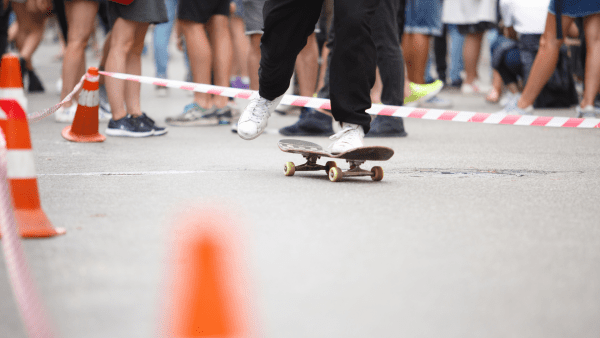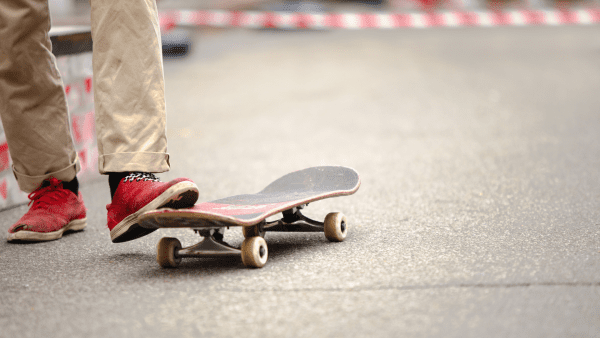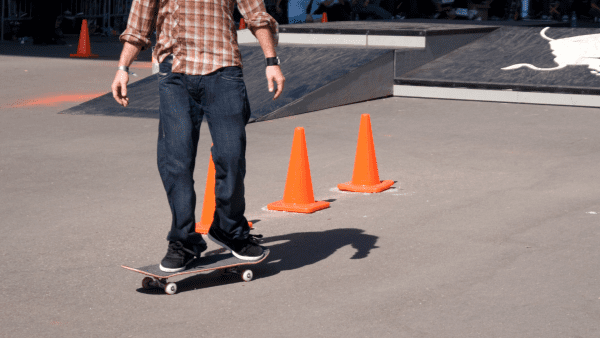We’ve all been there: standing at the edge of a skate park, watching in awe as the world’s best and most experienced skateboarders gracefully navigate skateboarding ramps and rails.

The world’s best skating events like the Vans Park Series and Hot Wheels Junior Park Series showcase the thrilling possibilities of what can be achieved on a board, fueling the inspiration for both novices and pros alike to push the boundaries of their abilities. So, what are you waiting for? Join any of these skate park series. Head to your local skate shop and see whether you can get the best skateboard to join one of the best street contests or skate park series.
The world of skateboarding competitions can seem intimidating to a beginner, but don’t let that stop you from diving in and giving it a shot, even as a beginner. Here at FamilyHype, we understand the apprehension of embarking on a new adventure. That’s why we’ve put together this beginner’s guide for those who compete in street contests for the amateur skateboarding category.
From understanding the rules and regulations to mastering basic moves, we’ve got you covered! We will also help you learn the skateboarding history, and choose the right equipment at a local skate shop so you can prepare for a contest in Salt Lake City – a dream for most skateboarders. We will also guide you in preparing for your first skate competition, getting the right board from the best skate shop, performing under pressure, and analyzing your results afterward. Our advice is practical yet empathetic; we remember our beginner’s nerves and want to help ease yours with seasoned insight.
So take a deep breath and grab your board or, get an extra board from your favorite skate shop. Together, we’ll turn that apprehension into excitement as you prepare for your debut on the skateboarding scene.
Skateboarding is an ever-evolving sport that involves an intricate blend of physical and mental skills such as balance, agility, coordination, and flexibility. It also requires proper safety skate gear, including a skateboard helmet, skateboard elbow pads, and skateboard knee pads. With the right skateboard equipment, knowledge of the skateboard rules, and a bit of skateboard practice, you can be ready to compete in no time.
Remember, everyone starts somewhere – why not start now?
Key Takeaways
We’ve all been there, starting in the world of street skateboarding competition for a beginner. It’s tough, but remember – everyone was a beginner once! Everyone experienced being confused about which board to buy from the skate shop. We want to make sure you start on the right foot. Don’t forget to master the beginner basics of skateboarding, choose your gear wisely, and prep thoroughly for each competition. With skateboards, you need to choose the right skateboard for the terrain you’ll be riding on, the type of skateboard tricks you plan to do, and your skateboard riding style. Consider different skateboard sizes, skateboard shapes, skateboard wheelbase, wheel durometer, and weight when selecting your skateboard.
While you’re at it, don’t forget to check out our list of skateboard brands and manufacturers for more skateboard tips and tricks. Popular skateboard brands like Element, Plan B, and Powell-Peralta offer a range of skateboards with different features and styles.
During the competition, stay focused and afterward reflect on your skateboard performance. You’ll grow with each skateboard experience, and soon enough, you’ll be carving up that skateboard park like the top skateboard pros!
Keep at it; we believe in you! As you gain confidence and skateboard experience, you’ll be sure to improve your skateboarding skill levels and be ready for the next competition. If you enjoyed this article, please share your skateboard thoughts and skateboard experiences with us – we’d love to hear from you!
Skateboarding Competition Rules And Regulation
Skateboarding is a fun and exciting activity, but we need to understand the beginner rules and regulations to ensure safety and fairness in any competition. Picture them as invisible guidelines that shape our performance on the skateboard.

Knowing and understanding the judging system is key in any competition, so take some time to strategize your moves.
Don’t forget understanding the skateboard rules and regulations is just as important in skateboarding as it is in any other skateboarding competition. So, take some time for us to get to know the guidelines and glide into mastering the basics of skateboarding.
Skateboard Basics For Beginners
Now that we’ve covered the rules and regulations for skateboarding competitions, let’s dive into the core of skateboarding itself – learning the basics of skateboarding.
We’re talking about essential skateboard skills you’ll need to master, as well as some basic skateboard tricks and techniques that will boost your confidence and set you up for more advanced skateboard moves later on.

Essential Skateboard Skills
Mastering the art of balance, agility, and control on your beginner skateboard isn’t just fun; it’s essential if you’re planning to compete in any street skateboarding or park skateboarding competition. We strive to provide beginner readers with the most up-to-date information so they can stay ahead of the street and park skateboard competition and perform their best tricks.
To get the most out of your beginner skateboard, here’s a quick rundown of essential beginner skills:
- Skateboard maintenance: Keeping your skateboard in top shape is essential for a smooth ride and a long-lasting skateboard.
- Injury prevention: Wearing skateboarding protective gear such as helmets, and knee and elbow pads is essential for staying safe while skating.
- Master basic skateboard maneuvers: Practice makes perfect. Spend time getting familiar with the basics of skateboarding, such as skateboard ollies, skateboard kickflips, and skateboard pop shuvits.
- Learn from others: Join local skateboarding communities and learn from experienced sponsored skaters. This is the best way to improve your beginner skills and stay up-to-date on the latest skateboarding trends.
Next, we’ll delve into mastering basic beginner tricks and techniques for competition readiness.
Skateboard Basic Tricks And Techniques
Ready to take your skateboarding skills to the next level? Let’s dive into the essential skateboarding tricks and techniques that FamilyHype can help you master. From beginner ollies to grinds, kickflips to slides, trick execution is key. So, practice regularly, and don’t forget the importance of technique refinement and patience!
Skateboarding Competition For Beginners
When it comes to skateboarding, it’s essential to have the right skateboards to ensure your safety and maximize your performance. We’re concerned not just with the family unit but also with the individual. So, we highly encourage you to take the necessary steps to ensure you’re properly equipped for your skateboard ride.
Be sure to look into the skateboard’s attributes and values, such as the skateboard deck, skateboard trucks, skateboard wheels, and skateboard bearings, for maximum performance and control. Additionally, look into the skateboard’s shape, width, and length to find the perfect fit for your feet. Lastly, explore the different types of skateboarding such as freestyle, street, longboard, downhill, and vert to discover which style you prefer.
With these tips, you’ll be ready to take on the skate park with confidence and poise.
Helmet Selection and Board Maintenance are key aspects to consider. A well-fitted helmet can be a lifesaver, so take the time to make sure it fits properly. It’s also important to maintain your skateboard to guarantee smooth rides and better performance as an integral part of your life organization.
Now that we have the necessary skateboard equipment, let’s get ready for the trick contest or competition!
With these in mind, let’s focus on the importance of selecting the right skateboard gear for a safe and enjoyable ride in the park or on the streets.
Beginners Skateboard Competition Preparation
Now that we’ve sorted our gear, it’s time to prepare mentally and physically for the skateboarding competition.
- Dietary preparation is crucial—fueling your body with the right nutrients will ensure optimal skateboard performance. Along with physical preparation, mental conditioning is just as important. Taking time to practice focus and concentration will help you stay calm and ready during one of your best trick contests and competitions.
- It’s not an easy journey, but the preparation will bring the reward of the rush and thrill of competing itself. As you prepare for the skateboarding competition, we encourage you to fuel your body with the right nutrition, practice mental conditioning, and seek feedback from friends and family for further insights.
- Skateboards, skateboard accessories, and skateboarding have a lot of different nuances, so make sure you practice and get familiar with the different types of skateboards, tricks, and safety gear.
Tips During Skateboarding Competition
As we dive into the heart of the competition, we’ll offer some tried-and-true advice on performing your best under pressure and managing those inevitable nerves.
From years of experience in the field, we know that mastering these aspects is as crucial to success as perfecting your techniques.
Together, we’ll unravel practical skateboard tips and tricks for keeping cool, harnessing energy positively, and truly shining when it’s your time on the skateboard.
Beginner Tips
Feeling the rough grip tape under your shoes, you’ll want to focus on mastering your fundamental skateboarding tricks first.
We understand the importance of injury prevention and urge you not to push yourself too hard too soon.
Mental conditioning is equally important – visualize your performance, stay positive, and focus on the overall experience rather than winning.
The skateboarding community is an incredible foundation of support that should be cherished and served.
Now that we’ve covered skateboard performance tips, let’s tackle how to handle pressure and nerves.
Handling Pressure And Nerves
Post-Competition Analysis
So let’s not skip this step!
Conclusion
Frequently Asked Questions (FAQs)
How To Get Into Competitive Skateboards?
To get into competitive skateboarding, practice your skills. Participate in local skateboarding street contests so you can hone your skills. Join an annual event in your area. Jive with the live music and gradually work your way up to a larger competition like the X Games, Vans Park Series, or the Grind for Life Series charity event. Entering the top amateur skate competition can be a significant first step. Look for an annual event near you so you won’t have to worry about skateboard travel expenses that much.
In any case, skateboard competitors usually have budgets that cover travel expenses from their localities or sponsors. If you want to join the top amateur skate competitions, you need to find sponsors that will not only support your journey but will also pay for travel expenses.
What To Do In Skateboard Competition?
In top amateur skate competitions, expert skaters compete by showcasing their tricks and skills on a designated course or park to earn points from one or five judges or more, with the chance to win skateboard cash prizes, skateboard bragging rights, and skateboard recognition. Each skateboard event typically has specific rules and criteria for earning points towards their skateboard cash prize.
Is 21 Late To Start Skateboard Riding?
No, the ages of 21 and even 22, are not too late to start skateboard riding; many pro skaters have begun later in life and still achieved success and enjoyment in the sport. Regardless of age, skate parks welcome skaters of all skill levels. You are free to do what you like and skateboarding is not an exception to that!
Can I Become A Pro Skateboarder?
Yes, you can become a pro skateboarder by honing your skills, participating in best trick contests, gaining sponsorships, and earning recognition within the skateboard riding community. Putting your best foot forward in every performance can increase your chances of sponsorship, especially in events like the Grind for Life Series charity skate contest. When you’re a pro, you also get the chance to go abroad with all travel expenses paid by your sponsor.
How Do I Start Practicing Skateboarding?
You can start practicing skateboard riding by getting a skateboard and protective gear, finding a local skatepark or suitable area, and gradually learning basic techniques and tricks. Many choose to start at local skate parks to practice. When you finally learn to ride, you can get sponsorship and go abroad for top amateur competitions with all travel expenses already paid for.
How Do Skateboarders Train?
Skateboarders train by consistently practicing tricks to improve their balance and coordination, maintain physical fitness, and develop their skateboard style and creativity. To get a comprehensive experience, some participate in a skateboard riding tour or any amateur skateboarding tour.
Can You Make Money Skateboarding?
Yes, professional skateboarders, athletes, and winners can make money through sponsorships, street contests like the Empire Open, Red Bull Solus, Tampa Pro, Copenhagen Open, Tampa Pro, Dew Tour, Red Bull Hart Lines (which popularized Ryan Sheckler) and semi-finals winnings, merchandise sales, and endorsements. These events are not your ordinary skate jam. Many professional skateboarders earn cash prizes through top amateur competitions and even in charity events like the Grind for Life Series charity skateboard competition. Skateboarders like Jamie Foy, Eric Koston, Steve Berra, and Tony Hawk who turned turned pros are popular names in the world of street league skateboarding. The beginner sport can be profitable and nonprofit at the same time.
How Can I Be A Good Skater?
To be a good beginner skater, practice skateboard riding regularly, challenge yourself with new skateboard tricks, study other skaters’ techniques, and focus on developing your unique skateboard style. Join a skate jam with other skateboarders. Taking part in a Zumiez Best Foot skateboard competition can be a good opportunity to measure your skateboard skills against others.
Moreover, remember that the top skate events in the world are made by a great team of skateboarders. If you want to be a great skater and win an event like this, find the best skateboard from your local shop and start practicing. Good preparation includes proper practice, endurance training, and impressive tricks training.
How Do You Become A Skater Girl?
Anyone can become a beginner skater girl by embracing the skateboarding sport, practicing riding a skateboard regularly, and immersing themselves in the skateboard riding community. Local skate competition events are often inclusive and open to all genders. Or better yet, start with a local skate jam in your region.
At What Age Does Competitive Figure Skating Start?
Competitive figure skating can start even for a young age, often around 5 to 7 years old, although beginner skaters of all ages can participate in various skill-level divisions. These often vary from a skateboard riding competition that runs on a different point scale. Well, if you believe that your skating talent runs in the blood, this is your time to shine.
Last Updated on July 11, 2024 by Mary Cimeni
DISCLAIMER (IMPORTANT): This information (including all text, images, audio, or other formats on FamilyHype.com) is not intended to be a substitute for informed professional advice, diagnosis, endorsement or treatment. You should not take any action or avoid taking action without consulting a qualified professional. Always seek the advice of your physician or other qualified health provider with any questions about medical conditions. Do not disregard professional medical advice or delay seeking advice or treatment because of something you have read here a FamilyHype.com.